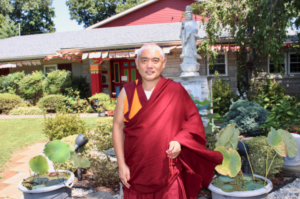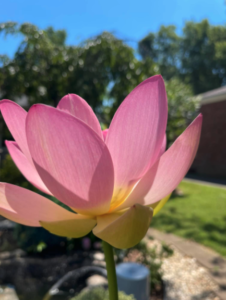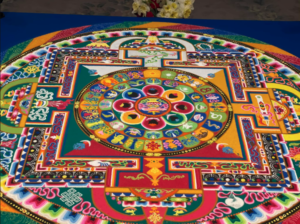Compassion in a Tumultuous World
Drepung Gomang Center for Engaging Compassion Turns 20
Writer / Andrew Toy
Photography Provided
 In a time when chaos and fear run rampant, compassion isnt a word that comes to mind often. However, compassion is what its all about at Drepung Gomang Center for Engaging Compassion (DGCEC).
In a time when chaos and fear run rampant, compassion isnt a word that comes to mind often. However, compassion is what its all about at Drepung Gomang Center for Engaging Compassion (DGCEC).
It was founded as a Tibetan Buddhist Dharma Center, the North American seat of Drepung Gomang Monastery – a large educational monastery in South India, and a monastery in exile from Tibet. Geshe Kalsang Rapgyal is DGCECs executive director and teacher.
Being an education center, DGCEC teaches universal human values, or secular ethics, as the Dalai Lama has guided them to do. Rapgyal offers dharma teachings, meditation and retreats (at least during non-COVID times). All three resident monks offer prayers and ceremonies daily for all who are suffering.
There is a secular perspective offered as well. After all, compassion can be taught to anyone with any religious or cultural background. People learn topics like meditation, earth reverence, nonviolence and compassion engagement.
How is all of this being conducted during the ongoing pandemic? Well, just like most other organizations and businesses, all the classes are being held via Zoom or Facebook Live. While it might be unfortunate that the centers 20-year anniversary (for which the tagline is Keeping Louisville compassionate) fell in the middle of this global crisis, and the students and teachers couldnt celebrate as they would have normally, Anne Walter, the director, is quick to point out simply – and optimistically – that it is the time that it is.
The kickoff anniversary celebration was held in October of 2021, with other little celebrations held throughout the year by gathering classes together virtually. The anniversary celebration continues through October of 2022, when they hope to be in person.
 How did DGCEC get its start here in Louisville? What exactly happened in 2001? It turns out that three Louisville women, Catherine McCliment, Carol Stewart and Amy Peterson, met a traveling group of Tibetan monks from Drepung Gomang Monastery in India. They were visiting the United States. The three women got to know the group and began to envision Louisville as a warm and welcoming home for the Tibetan Buddhist Center.
How did DGCEC get its start here in Louisville? What exactly happened in 2001? It turns out that three Louisville women, Catherine McCliment, Carol Stewart and Amy Peterson, met a traveling group of Tibetan monks from Drepung Gomang Monastery in India. They were visiting the United States. The three women got to know the group and began to envision Louisville as a warm and welcoming home for the Tibetan Buddhist Center.
Drepung Gomang Institute, as it was first called, was incorporated on October 1, 2001, even though they didnt yet have the location or the funds. What they did have was a compelling experience of and attraction to the compassion and loving kindness that these Tibetan Buddhist monks shared so effortlessly and freely. This was the fuel they used for their efforts.
Now, just 20 short years later, DGCEC is one of Louisvilles finest treasures for those seeking to help make the community, and the world, a better place. At the Dharma Center there are opportunities to reserve a Retreat Room, or to meditate in the Shrine Room. Visitors and attendees can offer flowers and fruit, and on the first Saturday of every month one can partake in prayers to Green Tara, the most beloved of all the Tibetan feminine meditation deities. Green Tara, practitioners believe, responds with compassion to all in need, including those who are ill, in need of protection, and need help with lifes challenges.
DGCECs Compassion Education Center offers opportunities based in universal human values (His Holiness the Dalai Lama calls this secular ethics, which guides all people regardless of religious perspective) including compassion training, meditation classes, education on the meaning and practice of nonviolence, courses on respecting and revering the earth, and interfaith gatherings for world or community crises. They host Louisville Recovery Sangha, movie nights, and a chance to experience Tibetan takeout food.
Its not so much about supporting us, Walter says, when asked about how the community can support DGCEC. Our causes are peoples causes, right? We want to help generate compassion in the community, and that happens one person at a time. Five years ago we began Louisvilles Arms of Compassion. We meet every Friday and remember by name those who have been killed by homicide, and we stand in solidarity with their families. Then also, we take a pledge of nonviolence. Were working on growing nonviolence ourselves by participating in it. We want to invite people to be a part of that. Its very informal, 30 minutes long, and we meet at noon on Fridays. Right now its on Zoom.
I think its fair to say that we exist to serve the community, Walter continues. Geshe Rapgyals teachings serve those who are interested in being practicing Buddhists, but also people who are just interested in the philosophy and trying to be better people. Were just looking to do what our role is in the community.
Rapgyal sheds some light on interfaith efforts.
 My personal experience is that we can more understand the common values and we can attach the two together and respect each other and have conversations – and share each others wisdom, Rapgyal says. The main goal, the believers and the followers, is to become good people. That is what interfaith relationships are.
My personal experience is that we can more understand the common values and we can attach the two together and respect each other and have conversations – and share each others wisdom, Rapgyal says. The main goal, the believers and the followers, is to become good people. That is what interfaith relationships are.
It takes the form of gathering people to make statements, to stand for a justice issue, or to pray after theres been a disaster, Walter adds. We convene some interfaith gatherings, and then we participate in ones that are started by other groups too.
Walter says the end goal is to help people become more compassionate, however they choose to do so.
The biggest project DGCEC hopes to launch is called Nonviolent Compassionate Louisville, a catalyzing project, where different people from the community, from organizations to schools to businesses, are invited to explore the elements of nonviolence and implement them into their lives.
What exactly is the foundation of compassion, according to DGCEC? To not harm. The commitment not to hurt another, as Walter says, is what allows space to love one another toward building compassion, which is being willing to suffer with another and wanting to alleviate that suffering.
For more info, visit drepunggomangusa.org.




